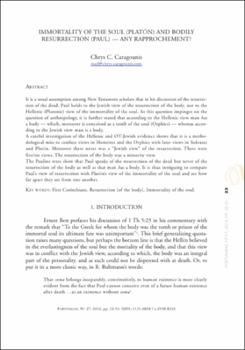Immortality of the Soul (Platōn) and Bodily Resurrection (Paul) — Any Rapprochement?
Autor
Caragounis, Chrys C.Fecha
2016Resumen
It is a usual assumption among New Testament scholars that in his discussion of the resurrection
of the dead, Paul holds to the Jewish view of the resurrection of the body, not to the
Hellenic (Platonic) view of the immortality of the soul. As this question impinges on the
question of anthropology, it is further stated that according to the Hellenic view man has
a body — which, moreover is conceived as a tomb of the soul (Orphics) — whereas according
to the Jewish view man is a body.
A careful investigation of the Hellenic and OT-Jewish evidence shows that it is a methodological
miss to confuse views in Homēros and the Orphics with later views in Sokrates
and Platōn. Moreover there never was a “Jewish view” of the resurrection. There were
five/six views. The resurrection of the body was a minority view.
The Pauline texts show that Paul speaks of the resurrection of the dead but never of the
resurrection of the body as well as that man has a body. It is thus intriguing to compare
Paul’s view of resurrection with Platōn’s view of the immortality of the soul and see how
far apart they are from one another.





